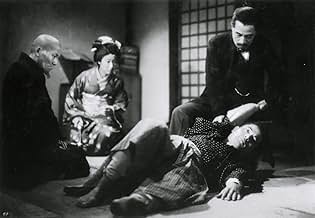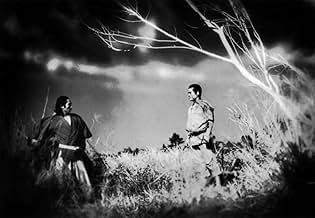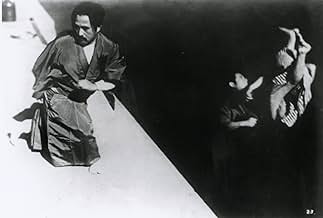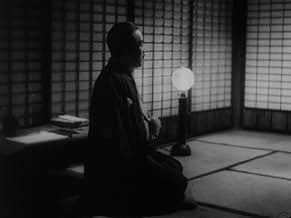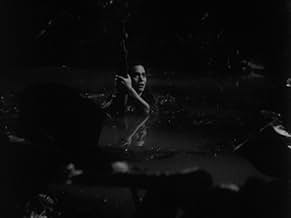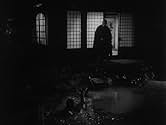Sugata, um jovem, luta para aprender o significado do judô e, ao fazê-lo, aprende algo sobre o significado da vida.Sugata, um jovem, luta para aprender o significado do judô e, ao fazê-lo, aprende algo sobre o significado da vida.Sugata, um jovem, luta para aprender o significado do judô e, ao fazê-lo, aprende algo sobre o significado da vida.
- Direção
- Roteiristas
- Artistas
- Hatta
- (as Michisaburo Segawa)
- Monma's pupil
- (não creditado)
- Direção
- Roteiristas
- Elenco e equipe completos
- Produção, bilheteria e muito mais no IMDbPro
Avaliações em destaque
The outstanding, mind-blowing camera-work that Kurosawa is known for is in a huge development process here, on account of this being his first work; however, even though not yet in a full-fledged form, everything that is meant to be portrayed comes through wonderfully. The story is another factor that definitely enhances the representation taking place in the film, as it matches perfectly with the cinematic techniques Kurosawa puts to work. If there are any inconveniences to be encountered throughout the course of the film, it would all obviously be as a result of the cut-off already mentioned.
The conspicuous acting goes without saying; everyone in the film fits into their roll perfectly. The main character may probably come as overacted to an audience not familiarized with Kurosawa's work, or Japanese cinema for that matter; Susuma Fujita would not be as well-known as Toshiro Mifune would later become, but he undoubtedly does his best here.
The film, despite the cut-off, works perfectly. One can just wonder how much better this could be if it were in its full form, as first conceived by the director.
According to a very interesting online article by Walter Klinger, the film was submitted to two distinct forms of censorship. First of all, during production, from government censors urging Kurosawa to make a film glorifying Japanese warriors and their spirit of devotion to "chuukou", i.e. "loyalty and devotion" understood as an infallible principle requiring absolute loyalty to one's superiors and blind obedience to orders (a principle that made Kamikaze pilots possible). In the pond scene, Sanshirô's master urges him to follow "chuukou" and after his nighttime revelation, Sanshirô bows obediently to his master.
In the post-war period, all references to this principle were outlawed by the General Headquarters of the Supreme Commander for the Allied Forces (SCAF - the occupying Americans) as an anti-social remnant of Japanese feudalism which was perceived as the root cause of Japan's stubborn refusal to surrender. Not only was the "chuukou" word excised from that scene in mid-sentence (and never put back in, even in the "restored" version) but all subsequent editions of the novel the film was based on, even in animé or manga form or in film remakes and sequels, were also excised for the same reason, which means that the hero was reduced to finding "satori" in other more universal Zen sources or nuanced feelings, such as the love of his beloved, the realization of his own selfishness or respect for his master.
As post-war young Japanese people weren't particularly fond of "chuukou" to begin with, especially as it concerned blind devotion to tradition and unconditional loyalty to one's parents (or employers), this was not seen as a major problem.
The SCAF, however, also outlawed scenes of feudal loyalty, cruel violence and the "undemocratic idea of revenge", "feudal" commodities for which the Japanese public never really lost its tremendous appetite, and which eventually became the main themes of Yakuza, samurai and martial arts films. Furthermore, martial arts, including judo, with their stigma of "warrior's ways" and "blind obeisance", were also banned from government-sponsored settings like schools and police departments, until 1950, at the very time when they were conquering the rest of the civilized world, including America.
Você sabia?
- CuriosidadesWhen asked about his experience filming his debut movie, Akira Kurosawa said "I simply enjoyed it. I went to sleep each night looking forward eagerly to the next day's shooting, and there was absolutely nothing painful in the experience... the whole task was carried out with a feeling of ease."
- Citações
Sanshiro Sugata: The spirits of heaven and earth congregate in our nation of gods. For us they have built Mt. Fuji that towers for eternity. For us they have brought water to flow around our islands. For us they have created the beauty of cherry blossoms...
[he stops and remembers Sayo]
Buddhist Priest: [hits Sanshiro on the head] Idiot! This is an important match. What the hell are you thinking?
Sanshiro Sugata: I can't do it. I can't win.
Buddhist Priest: What? Are you afraid of Hansuke Murai?
Sanshiro Sugata: No. Someone stands between him and me.
Buddhist Priest: Who?
Sanshiro Sugata: His daughter.
Buddhist Priest: You love her?
Sanshiro Sugata: No. It's not that. Priest, I saw her praying selflessly for her father. It was beautiful and I was touched. That's the problem. How can I overcome it?
Buddhist Priest: Stupid! Be pure and innocent like her.
Sanshiro Sugata: I can't.
Buddhist Priest: You can. You once were.
Sanshiro Sugata: When?
Buddhist Priest: [pointing to the pond] Sanshiro Sugata found new life there. Have you forgotten? What is your life, Sanshiro?
- Versões alternativasAlthough originally released in Japan at 97 minutes, it was re-edited and re-released in Japan in 1952 at 80 minutes. This 80-minute version is all that is currently available, and it includes some slight changes in the film's structure as well as its running time.
- ConexõesFeatured in Kurosawa: The Last Emperor (1999)
Principais escolhas
- How long is Sanshiro Sugata?Fornecido pela Alexa
Detalhes
- Tempo de duração1 hora 19 minutos
- Cor
- Mixagem de som
- Proporção
- 1.37 : 1
Contribua para esta página


